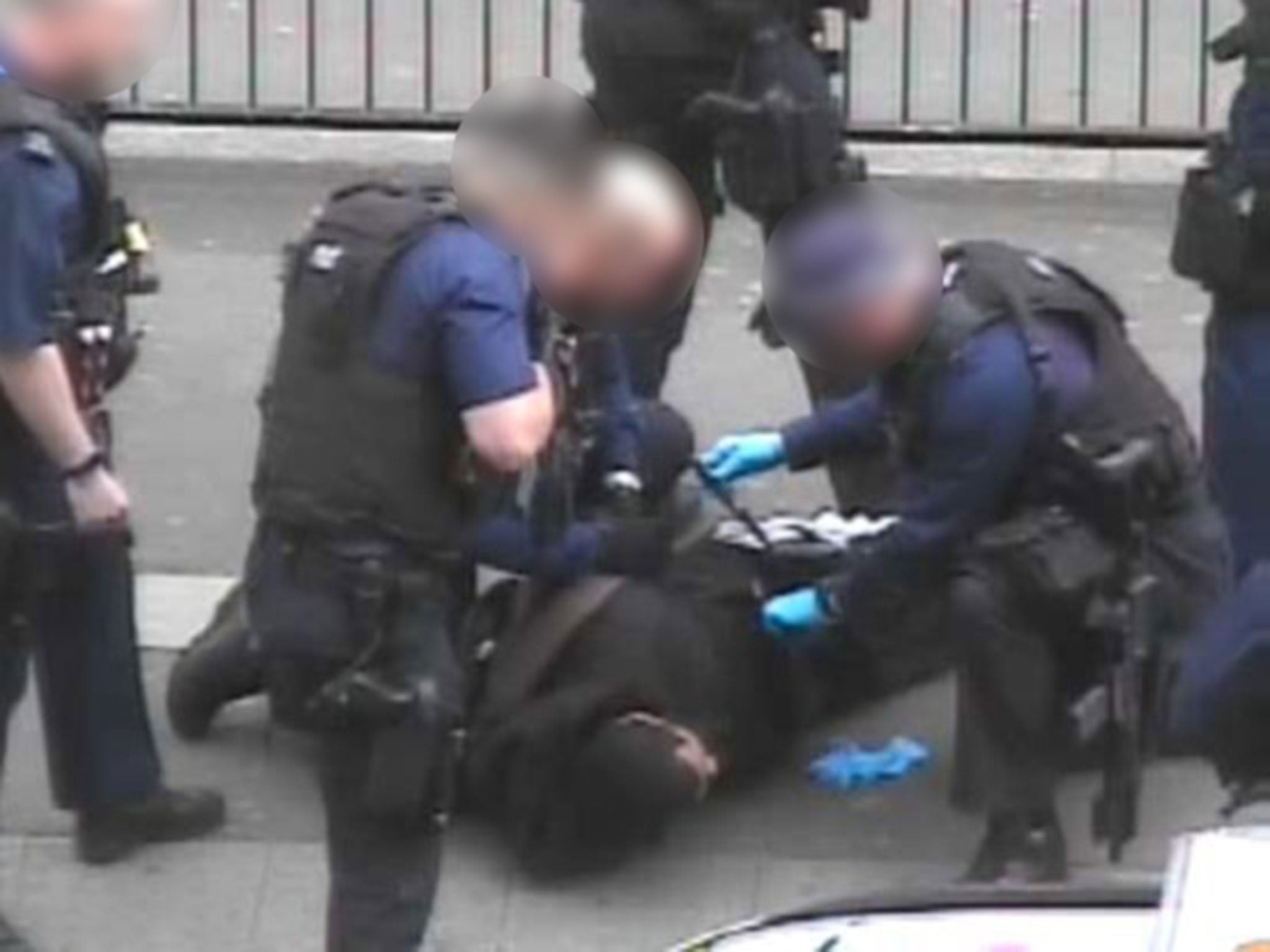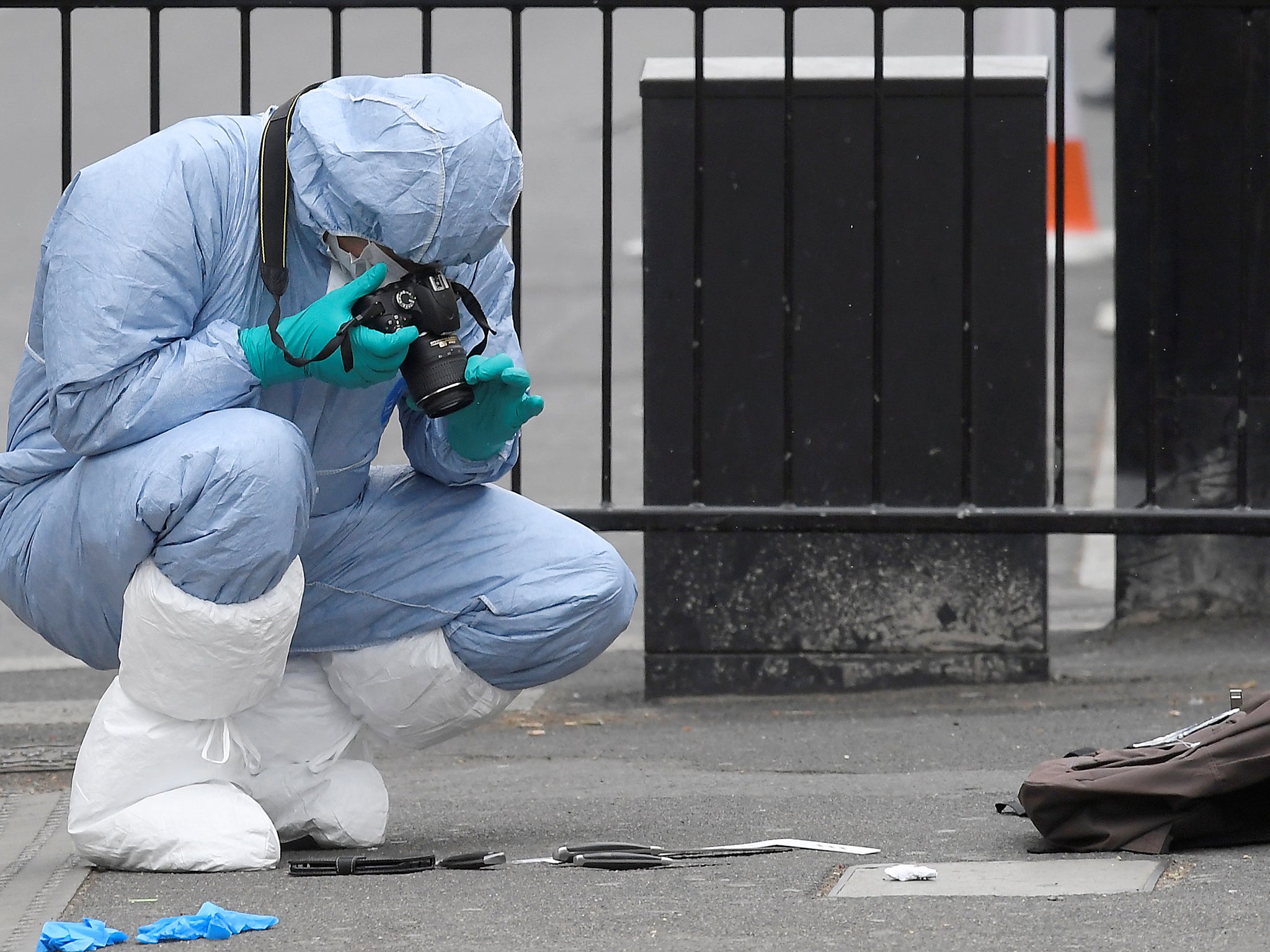Taliban bombmaker who attempted Westminster knife attack jailed for life
Judge says Khalid Ali wanted ‘maximum publicity and instil terror’ with atrocity four months after Westminster attack
A Taliban bombmaker who attempted a terror attack in Westminster has been jailed for a minimum of 40 years.
A judge handed Khalid Ali multiple life sentences for making explosives to be used against British and Nato troops in Afghanistan, and for attempting a knife massacre in London just months after his return to Britain.
Dramatic footage showed the 28-year-old being surrounded by armed police and forced to the ground in Whitehall in April last year.
Officers found he was armed with three knives that they pulled out and threw to the ground in front of terrified tourists.
Ali claimed he wanted to deliver a “message to British leaders” and was prepared to kill, just four weeks after the UK’s first Isis-inspired terror attack unfolded metres away.
Judge Nicholas Hilliard QC said he aimed to attract “maximum publicity and instil terror”.
“I am absolutely sure you were in Afghanistan,” he added. “You were a valued member of a team making IEDs that were detonated in combat before January and July 2012.
“I have no doubt whatsoever that there is a very considerable risk of your committing offences of violence in the future and cause death or serious injury as a result.

“I’m sure your plan was to attack and kill someone in central London. Your preparations were complete and you very simply had to identify your precise target and his or her death was very likely to be caused by a knife attack. You would kill any police officer you could.”
Prosecutor Brian Altman QC told the Old Bailey Ali aimed to launch a “deadly terror attack to strike at the very heart of this country’s democracy, by killing a police officer, a member of the military or even a parliamentarian”.
Four months before he was stopped, the FBI had matched his fingerprints to two caches of explosives recovered by Afghan forces in 2012, but police said they waited to arrest Ali until the “most appropriate time”.
Metropolitan Police deputy assistant commissioner Dean Haydon said there was a “time lag” between the FBI linking Ali to the Taliban bombs and his arrest because “due legal process” needed to be followed to collect the evidence from abroad.
He defended the decision not to move in before Ali was armed and within metres of parliament, saying police and security services were “managing any potential risk he posed and he was arrested at the most appropriate time”.
“Thanks to the work of the counterterror policing network and the Firearms Command, Ali never succeeded in realising his murderous plan,” Mr Haydon added on Friday.
In an interview with officers, Ali said he wanted to deliver a message to British leaders telling them to leave “Muslim lands”, destroy the state of Israel and release prisoners of war.
“I would consider myself as a mujahid [Islamic warrior],” he added. “Jihad is what we do … and I am here to let you know the reason why I have come with the message, for you to make the right decisions, if not … we have a lot of time. UK is next on the list.”
Ali declared his loyalty to the Taliban and told how he made bombs and “pressed the button” more than 300 times in attacks targeting American and British soldiers spanning five years.

The terrorist camp he trained at was also affiliated to al-Qaeda, and he listened to speeches by the group’s ideologue Anwar al-Awlaki calling on followers to wage jihad.
He denied terror offences but when asked why he was carrying knives on the day of his arrest, Ali replied: “I had the knives ready to kill, but only in self-defence.”
His family told how he trained as a gas fitter and plumber at college and started working for his brother’s business, but started to wear Islamic attire, grow a beard and frequently attend a mosque in early 2010.
Later that year, Ali joined the Road to Hope aid convoy to Gaza, where he was among British citizens kidnapped on a Greek ship before being freed.
Then in 2011, he told his family he was moving to Birmingham for work as a pretence to travel to Afghanistan via Abu Dhabi, and did not speak to them for five and a half years.
Police launched a missing person case that continued until Ali surfaced at the British consulate in Istanbul in 2016, claiming he had lost his passport and asking for emergency travel documents to return to the UK.
Suspicious officials raised the alarm and Ali was arrested upon arrival at Heathrow, but he claimed he had been travelling and denied any affinity with extremism before being released.
Fingerprints taken during the stop were matched to those recovered by American authorities on a cache of bomb components seized from the Taliban.
Ali said he had originally left the UK because he was under pressure to marry and felt trapped as MI5 and counterterrorism police allegedly tried to recruit him.
When questioned in court, he told the jury he had merely travelled to Pakistan for “tourism and hitchhiking” but was taken captive by the Taliban.
Pushed to explain why his fingerprints were all over bomb components, Ali claimed that he was forced to do the work at gunpoint to prove he was not a British spy.
But just four months after his return to Britain he was planning an attack on home soil, using an anti-racist march through central London as cover to conduct reconnaissance at Downing Street in March 2017.
The following month, he scouted out the MI6 building, Westminster Bridge and the Houses of Parliament, where he photographed cameras, guards and potential access points.
Ali’s mother became alarmed after finding knives in his bedroom at their London home, and he fled after she called police.
The next day – 27 April 2017 – Ali purchased a new set of blades, a rucksack emblazoned with a British flag and set out on his mission.

